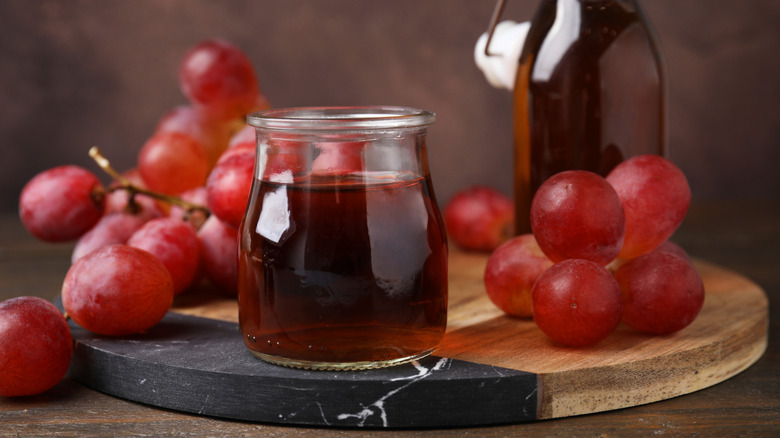Is There Alcohol In Red Wine Vinegar?
You may have heard someone claim that if an open bottle of wine is left out too long, it will turn into vinegar, or that if your wine is corked, it has basically turned (or started to turn) into vinegar. This isn't a myth — it really happens, and in that case, it'll usually have a tart, acidic taste that won't taste like "normal" wine.
This is pretty much what red (or white) wine vinegar is — wine that has acidified and fermented more. (However, red wine vinegar on the supermarket shelf isn't generally made by leaving wine out and waiting for it to turn — it's made by adding extra acid to effectively speed up that process.) But does that end product still have alcohol in it? Quite possibly, yes — although there won't be much, and the exact answer to this question can vary across different vinegars, depending on how exactly they were processed. However, if you need to absolutely avoid alcohol, you should generally assume that yes, red wine vinegar does contain alcohol. That said, the amount of alcohol in there should generally be minimal — vinegar makers aren't generally required to list the alcohol volume, but depending who you ask, it probably varies from as little as 0.1% up to 2% alcohol by volume. Generally, commercially sold vinegar is required to have 0.5% alcohol by volume or less.
How red wine vinegar is made and why it still has alcohol
As you likely guessed from the name, red wine vinegar is made with red wine. More or less all vinegars start out with some kind of alcohol, at least in terms of how the FDA defines them — the difference is that, red wine vinegar starts out with grape juice, while cider vinegar, for example, starts out with apple juice, or rice vinegar starts out with rice wine. (Balsamic is a bit different, starting out as grapes but processing the juice in a different way, so it's never technically wine.) The red wine you buy in stores takes that red wine and adds specific bacteria that comes from fungus to eat at the alcohol. This effectively oxidizes the wine, turning the wine into acetic acid. This is basically a fermentation process — but it's a different fermentation to the kind that produces wine — in that case, yeast is added (rather than the fungal bacteria) to ferment the sugars in grape juice, turning them into alcohol.
Although wine will oxidize over time and "go bad", red wine vinegar doesn't really go bad due to its particularly high acid content. That said, if you leave it open, it can oxidize more, so if you've got a fancy red wine vinegar that you want to preserve, it would be wise to keep it sealed, stored in the dark, and deprived of oxygen to prevent that from happening.

